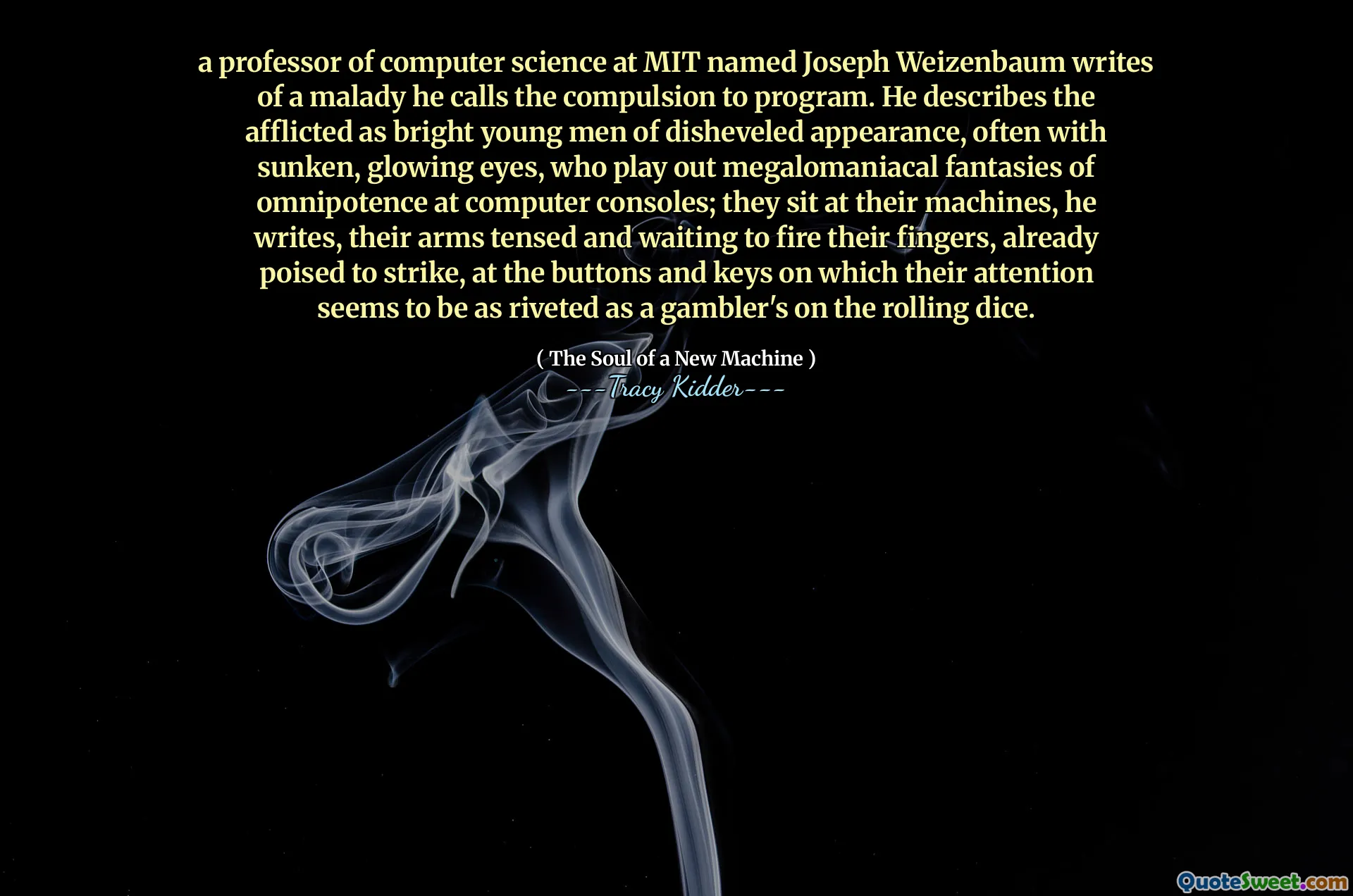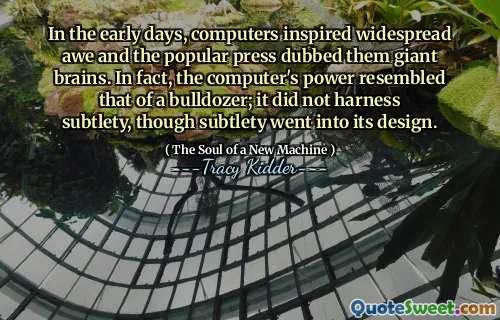
йЇїзЬБзРЖеЈ•е≠¶йЩҐзЪДиЃ°зЃЧжЬЇзІСе≠¶жХЩжОИзЇ¶зСЯе§Ђ¬ЈйЯ¶ж£Ѓй≤НеІЖпЉИJoseph WeizenbaumпЉЙеЖЩдЇЖдЄАдЄ™зЦЊзЧЕпЉМзІ∞дїЦзІ∞дєЛдЄЇиЃ°еИТгАВдїЦе∞ЖеПЧиЛ¶зЪДеєіиљїдЇЇжППињ∞дЄЇиБ™жШОзЪДе§ЦиІВпЉМзїПеЄЄеЄ¶зЭАж≤Йж≤°пЉМеПСеЕЙзЪДзЬЉзЭЫпЉМеЬ®иЃ°зЃЧжЬЇжОІеИґеП∞дЄКжЙЃжЉФжЧ†жЙАдЄНиГљзЪДзЛВзГ≠еєїжГ≥гАВдїЦеЖЩйБУпЉМдїЦдїђеЭРеЬ®жЬЇеЩ®дЄКпЉМжЙЛиЗВзіІеЉ†пЉМз≠ЙзЭАе∞ДеЗїжЙЛжМЗпЉМеЈ≤зїПеЗЖе§Зе•љжЙУеЗїдЇЖпЉМдїЦдїђзЪДж≥®жДПеКЫдЉЉдєОеГПиµМеЊТзЪДжОЈй™∞е≠РдЄА憣襀еЕ≥ж≥®гАВ
(a professor of computer science at MIT named Joseph Weizenbaum writes of a malady he calls the compulsion to program. He describes the afflicted as bright young men of disheveled appearance, often with sunken, glowing eyes, who play out megalomaniacal fantasies of omnipotence at computer consoles; they sit at their machines, he writes, their arms tensed and waiting to fire their fingers, already poised to strike, at the buttons and keys on which their attention seems to be as riveted as a gambler's on the rolling dice.)
йЇїзЬБзРЖеЈ•е≠¶йЩҐжХЩжОИзЇ¶зСЯе§Ђ¬ЈйЯ¶ж£Ѓй≤НеІЖпЉИJoseph WeizenbaumпЉЙеЬ®еѓєеѓєзЉЦз®ЛзЪДзЧіињЈзЪДеПНжАЭдЄ≠пЉМ襀ињЩзІНеЖ≤еК®жЙАеЕЛжЬНзЪДдЇЇзЪДзЙєеЊБжШѓиБ™жШОдљЖдЄНжї°жДПзЪДдЇЇпЉМзїПеЄЄи°®зО∞еЗЇзЦ≤еК≥еТМеЫЇеЃЪзЪДиЇЂдљУињєи±°гАВдїЦе∞ЖдїЦдїђеѓєиЃ°зЃЧжЬЇзЪДеЉЇзГИеЕ≥ж≥®дЄОиµМеЊТеѓєй™∞е≠РзЪДеЕ≥ж≥®ињЫи°МдЇЖжѓФиЊГпЉМдїОиАМеЉЇи∞ГдЇЖдїЦдїђдЄОжКАжЬѓзЪДдЇТеК®еЗ†дєОеЉЇињЂжАІзЪДжАІиі®гАВињЩдЇЫз®ЛеЇПеСШдЉЉдєОжЛ•жЬЙеЃПдЉЯзЪДеєїжГ≥еТМеѓєжХ∞е≠ЧйҐЖеЯЯеЖЕзЪДжЭГеКЫзЪДжЄіжЬЫгАВ
WeizenbaumзЪДеИїзФїи°®жШОпЉМињЩзІНеЫЇеЃЪиМГеЫіиґЕеЗЇдЇЖдїЕдїЕжШѓжКАжЬѓжКАиГљгАВеЃГжИРдЄЇдЄАзІНжЈ±еИїзЪДењГзРЖзКґжАБгАВзФ®зіІеЉ†зЪДж≠¶еЩ®зЪДз®ЛеЇПеСШзЪДеЫЊеГПпЉМеЗЖе§ЗйЗКжФЊдїЦдїђзЪДеСљдї§пЉМеФ§иµЈдЇЇдїђзЪДжДПиѓЖпЉМеН≥дїЦ俐襀жЧ†жГЕзЪДйЗОењГеЊ™зОѓеТМеѓєжЬЇеЩ®жОІеИґзЪДжЄіжЬЫпЉМйШРжШОдЇЖдЇЇз±їдЄОжКАжЬѓдєЛйЧізЪДе§НжЭВеЕ≥з≥їгАВ











